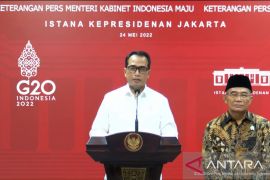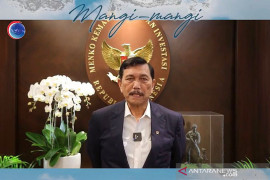"I emphasize that it is the president who evaluates the ministers performance. That is the principle," he stated at the signing of contracts for 2016 projects of the ministry of public works.
The president made the statement in connection with the issuance of accountability performance evaluation results of the ministries, state institutions, and regional governments for 2015 by the Minister of Administrative Reforms Yudhi Chrisnandi.
Sixteen ministries and state institutions have scored low, including the ministry of manpower, the ministry of village and backward region development and transmigration, the ministry of sports and youth affairs, and the attorney generals office.
Many believed that the evaluation result would be used by the president to replace his ministers.
President Widodo would not confirm whether Minister Chrisnandi had made the move on his order.
The president noted that the result of his evaluation of the ministers performance was a secret.
Regarding a cabinet reshuffle, he remarked that it was the presidents prerogative.
"Do not push, dictate (about it)," he affirmed.
Meanwhile, the office of the minister of administrative reforms stated that the chiefs of the offices were not judged during its evaluation of the performance of ministries and state institutions.
"We did it to not evaluate the performance of ministers or heads of offices but the organizations to show what they have accomplished," M. Yusuf Ateh, the deputy for bureaucratic reform, accountability and supervision of apparatus, remarked here on Wednesday.
The ministry of administrative reforms recently released the results of its accountability evaluation on the performance of all ministries and state institutions as well as regional administrations.
The administrative reforms ministry had never published the results so far, but under current Minister Yuddi Chrisnandi, they were made public to demonstrate transparency and an out-of-the box bureaucratic reform.
The move, however, has been considered controversial as it took place in the midst of rumors of another cabinet reshuffle.
Ateh explained that the evaluation was conducted annually, and it had been done since 2006 and was purely aimed at the organizations and not their chiefs.
"Evaluation is also not intended for gaining points, but its main goal was to improve the accountability performance of government institutions, so that every rupiah they spend could be made accountable and benefit the people," he emphasized.
He said it had also been done independently unlike the evaluation conducted by the State Audit Board (BPK) that also gave opinions on the financial reports of the offices being evaluated.
"The BPK conducts its own audit on all ministries and state institutions, while BPKs financial report is audited and evaluated by public accountants. The ministry of administrative reforms also conducts its own evaluation," he pointed out.
He said the evaluation of the ministry of administrative reforms is conducted independently by the Development and Financial Supervision Agency (BPKP), and the result was also transparent wherein the performance of the office had dropped from 77.35 points in 2014 to 77 in 2015.
According to the points, the administrative reforms office received a BB rating along with 20 other ministries and state institutions, he revealed.
Ateh stated that during the evaluation process, the office of administrative reforms had also involved the BPKP, the home affairs ministry, and provincial inspectorates.
"Evaluation is not done arbitrarily since it must be based on the reference that has been made. The Manual for Performance Accountability Evaluation is made jointly by involving the ministry of finance, the National Development Planning Board, and the ministry of home affairs," he remarked.
Ateh added that the main indicators for the evaluation were performance planning, including strategic planning as well as budgeting and performance agreements that were observed comprehensively and sustainably.
Reporting by Hanni Sofia Soepardi
(H-YH/INE)
EDITED BY INE.
Editor: Suryanto
Copyright © ANTARA 2016









